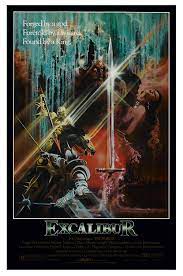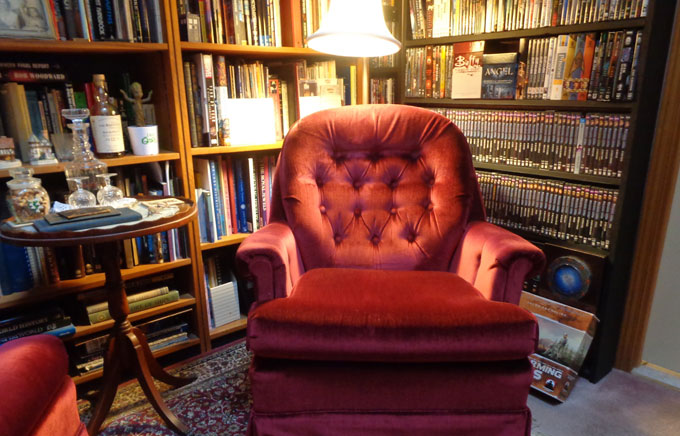
The sorcerer Merlin (Nicol Williamson) retrieves the sword Excalibur from the Lady of the Lake for King Uther Pendragon (Gabriel Byrne). The King desires Igrayne, the Duchess of Cornwall (Katherine Boorman), and Merlin agrees to help the King seduce her in exchange for any child resulting. His magic accomplishes this as her husband, the Duke of Cornwall (Corin Redgrave) is dying in battle, though his daughter Morgana Le Fay (Kay McLaren, then Helen Mirren) sees the truth. Nine months later, Igrayne gives birth to Arthur (Nigel Terry) and Merlin arrives to take him away. Uther chases after Merlin but is ambushed by Cornwall’s men. Before they kill him, he thrusts Excalibur into a great stone. Merlin announces that whoever pulls the sword from the stone will be the King.
Years later, Arthur does just that, proving that he is Uther’s son and the rightful King. Soon, his bravery and success in combat earns the trust and fealty of King Leodegrance (Patrick Stewart) and Sir Uryens (Keith Buckley). Arthur meets Guinevere and falls in love. Later, Sir Lancelot (Nicholas Clay) blocks a bridge, demanding a king worthy of his fealty. He defeats all the King’s knights and is challenged by Arthur, who with the help of Excalibur and the Lady of the Lake defeats Lancelot. Lancelot declares fealty to Arthur. Arthur and his knights unite Briton and Arthur creates the Round Table, begins building Camelot, and marries Guinevere. At the same time, his half-sister Morgana is apprenticed to Merlin.
Under the influence of Merlin, Sir Gawain (Liam Neeson) accuses Guinevere of treachery and offers to duel over her innocence. Arthur must judge the trial, so Lancelot fights for her honor. He wins the duel and wins her heart. Arthur discovers their affair and thrusts Excalibur into the ground between them. Merlin’s magical link to the land impales him on the sword and Morgana traps him and steals his Charm of Making. She takes the form of Guinevere and seduces Arthur.
She gives birth to Mordred (Charles Bookman and later Robert Addie). His incestuous nature brings famine and sickness to the land and Arthur is struck by lightning. Weakened, he sends his knights on a quest for the Holy Grail to restore the land and himself. Many of them die or are bewitched by Morgana. Mordred demands the crown but fails. He rebuffs Arthur’s attempt to recognize him as his son and resolves to return from exile with an army to take Camelot by force.
Perceval resists Morgana’s power and is the last knight searching for the Grail. After nearly drowning, he takes the Grail and brings it to Arthur, who drinks from it and is returned to health. The land is restored. He calls upon his stepbrother Sir Kay (Niall O’Brien) to rally his forces to attack Mordred and Morgana. Arthur finds Guinevere at a convent and they reconcile. She had kept Excalibur and gives it to him. At Stonehenge, Arthur falls asleep and his love liberates Merlin from Morgana’s magical prison. Merlin appears to Morgana and tricks her into speaking the Charm of Making which drains her power and fills the battlefield with mist. Mordred discovers her aged and decrepit true self and kills her.
Arthur and his men battle Mordred’s army, using the mist for cover. Lancelot arrives, reconciles with Arthur and dies in battle. Arthur kills Mordred but is mortally wounded. Dying, he orders Percival to throw Excalibur into the Lake in the hope that one day a worthy King will claim it. The Lady catches the sword and disappears beneath the surface. Percival returns to the battlefield and sees Arthur sailing away on a ship to Avalon.
The film was directed, produced, and co-written by John Boorman, lovingly but loosely based on Thomas Malory’s Le Morte d’Arthur in the 5th Century. The music is that of Richard Wagner, Carl Orff, and Trevor Jones. It was shot entirely in Ireland and employed Irish actors and crew and pretty much launched the Irish filmmaking industry. Some critics criticized the story but many praised its over-the-top visual style. Boorman had planned the film as far back as 1969 but the three-hour script, co-written with Rospo Pallenberg, was considered too expensive to film. Later, it was shortened somewhat. Some critics pointed out that certain scenes were reminiscent of scenes in Monty Python and the Holy Grail.
Boorman cast Nicol Williamson and Helen Mirren as Merlin and Morgana, knowing that they were feuding. The Irish landscape, with its forests and castles, is like a character in the movie. The love scene between Lancelot and Guinevere in the forest was filmed in the nude on a cold night. Bob Ringwood designed the costumes and received a BAFTA nomination. Boorman said that the old religion, represented by Merlin, is being swallowed up by the new Christian unconscious. Pieces of the Tristan and Iseult tale and the Arthurian stories by Chrétien de Troyes were used. It was controversial among critics but praised highly for its visuals and became a high-water mark in sword-and-sorcery. It received a Palme d’Or at the 1981 Cannes Film Festival and a nomination for cinematography at the 1982 Oscars.
John Boorman tried to defray the cost of the movie by directing Exorcist II: The Heretic. That became one of the biggest bombs ever filmed but Excalibur proved to be his big comeback. All the actors, now considered giants of the screen, were relative unknowns at the time, hired so the audience would concentrate on the story instead of the stars. Liam Neeson and Helen Mirren met on the set and lived together for four years. It rained about every day on the shoot but that enhanced the lushness of the landscape. The armor was made of aluminum. The set was so close to Boorman’s house that he slept at home every night. Polo ponies were used because they could be ridden with one hand while the rider held a weapon. A cameraman waited for days with the camera running for a single shot of a crow eating a dead man’s eye.
Shakesperean pontificating, graphic violence, and a great deal of mud--it’s as if somebody decided to do Monty Python and the Holy Grail but leave out the satirical bits. But I was fascinated. Boorman was obviously seriously in love with the Arthurian legends and Trevor Jones picked the perfect dramatic music to go with the sprawling visuals and the British stage actors.
